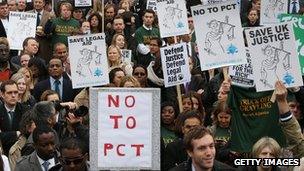Legal aid U-turn over price competition plan
- Published

Some legal aid protesters made their opposition to price competitive tendering (PCT) clear in May
Plans to cut the legal aid bill by awarding contracts to the lowest bidder have been dropped, Justice Secretary Chris Grayling has announced.
In an interview with the Times newspaper, external, Mr Grayling said the move was part of a deal he had reached with the Law Society for England and Wales.
Opponents of the policy had warned the policy would "irrevocably damage the criminal justice system".
But other cuts to legal aid are expected to go ahead.
In a statement in the Commons Mr Grayling said prisoners and households with more than £3,000 per month of disposable income would no longer be able to access legal aid.
And immigrants who had been in the country less than a year would be unable to access aid in civil cases, he said.
Ministers had intended to introduce price competitive tendering (PCT) as part of a string of reforms aiming to cut the £2bn annual legal aid bill in England and Wales by £350m a year.
BBC legal correspondent Clive Coleman said the proposal was very controversial, with concerns that the lowest bid would win in a "race to the bottom" which could impact quality.
He said that while the bidding proposal had been scrapped other savings would go ahead as the government remained committed to saving money on the legal aid system - said to be one of the most expensive in the world.
'Factory mentality'
There are currently 1,600 legal aid providers and there is potential for that number to be expanded if firms meet minimum quality standards.
The government plans to put a cap on contracts for duty solicitor work at police stations and to reduce legal aid fees by 17.5% across the board.
It also plans to set up a working party to look at how thousands of short hearings can be avoided, or dealt with by email or video link.
Its final proposals on legal aid reform will be subject to a six-week consultation, our correspondent added.
Mr Grayling said: "We will introduce a new residency test that will prevent most people who have only just arrived in the UK from accessing civil legal aid until a year after they had arrived.
"We will limit criminal legal aid for prisoners so that it is not available unnecessarily. There will be no more legal aid available because you don't like your prison.
"We will set out new rules that will mean the wealthiest Crown Court defendants - those in households with more than £3,000 in disposable income left after tax, housing costs and other essential outgoings - will have to fund their own legal costs."
He said that when the government set out its plans in April "I was clear that they were for consultation. I have kept that promise".
He said that the agreement is "a sensible proposal which is tough but realistic".
The shadow justice secretary, Labour's Sadiq Khan, described plans to drop plans to award contracts to the lowest bidder as "a humiliating climb-down" for the government.
He added: "If the government had their way, access to justice for many people would have been threatened, with the very real prospect of increased numbers of miscarriages of justice."
The charity Reprieve said the blocking of legal aid to immigrants who have been in the country less than a year would "deny justice to a wide range of people wronged by the UK government - from victims of torture and rendition to Gurkhas and Afghan interpreters denied the right to settle in Britain".
The organisation's legal director, Kat Craig, said: "The reality is that the residence test is the latest in a long line of attempts by the government to silence its critics in the courts.
"David Cameron and Nick Clegg once thought that torture victims and Gurkhas denied the right to live in Britain deserved their day in court - why are they now backing plans which would shut them out?"
Correction 17 September 2013: This story has been amended to clarify that is the legal aid system - rather than the legal system - that is said to be one of the most expensive in the world.
- Published2 July 2013
- Published18 June 2013
- Published20 March 2013